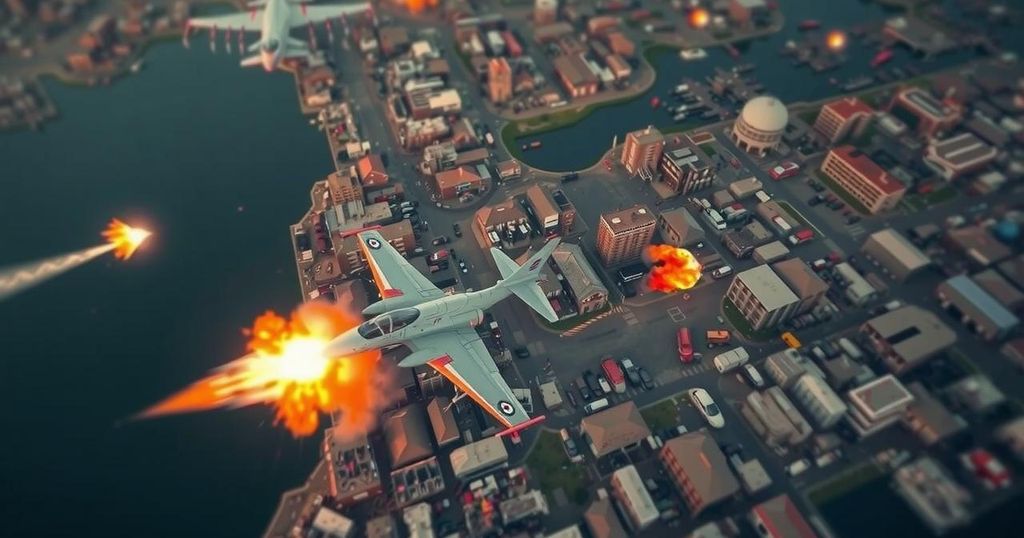Following a deadly attack on a state defense manufacturer in Ankara, Turkey retaliated with airstrikes in Kurdish-controlled regions of Syria and Iraq, resulting in the deaths of 12 individuals, including children, according to the Syrian Democratic Forces (SDF). Turkey’s military campaign targeted what it described as “terrorist sites,” while SDF leadership condemned the strikes as indiscriminate and harmful to civilians. The attack coincided with renewed dialogue efforts concerning the PKK leader Abdullah Ocalan.
In response to a deadly assault on a state-owned defense facility in Ankara, Turkey conducted airstrikes late Wednesday targeting Kurdish regions in both Syria and Iraq. This action was triggered by the attack on Turkish Aerospace Industries, which resulted in the fatalities of four individuals and left over a dozen others injured due to the actions of two perpetrators blamed by the Turkish government on the Kurdistan Workers’ Party (PKK). Video evidence reviewed by CBS News confirmed damage to electrical infrastructure in the Kurdish-controlled areas of Kobani and Qamishli, the latter being the capital of the Kurdish-majority region in northeast Syria. On Thursday, the Syrian Democratic Forces (SDF), which have been crucial allies of the United States in the fight against ISIS, reported that 12 individuals, including two children, were killed and 25 others were injured as a result of prolonged Turkish air and artillery assaults. Turkey’s Ministry of Defense stated it targeted 47 “terrorist sites” across Syria and Iraq. General Mazlum Abdi, the SDF commander, condemned the Turkish airstrikes, labelling them as indiscriminate and highlighting the collateral damage inflicted on civilian facilities, including hospitals. He asserted, “We have repeatedly shown our readiness for dialogue. Meanwhile, we affirm that our forces are ready to defend our people and land,” referring to the SDF’s commitment to protecting their regions against such attacks. Approximately 900 American forces remain stationed in the area as part of the global coalition against ISIS, with the SDF serving as the primary ground partner for the United States in the region. By Thursday morning, neither the U.S. Department of Defense nor Central Command had provided any statements regarding the assault in Ankara or Turkey’s retaliatory measures. Turkey perceives the U.S.-backed SDF, along with its political counterpart, the People’s Protection Units (YPG), to have direct affiliations with the PKK—a group that has sustained an insurgency in Turkey for several decades. The PKK is officially categorized as a terrorist organization by both Turkey and the United States and has its operational base in the Qandil mountains of northern Iraq, frequently becoming the target of Turkish military campaigns. No group has yet taken responsibility for the assault on the Turkish defense facility, which coincided with renewed dialogue between the Turkish government and PKK leader Abdullah Ocalan, who has been imprisoned in Turkey for over twenty years. Recently, Ocalan’s nephew Omer, a member of the Turkish parliament, shared a message from Ocalan indicating a willingness to conclude the long-standing violent conflict with the PKK. Additionally, Devlet Bahceli, the leader of the Nationalist Movement Party and an ally of President Erdogan, invited Ocalan to address parliament, suggesting the possibility of a parole arrangement in exchange for the PKK’s disbandment.
The ongoing conflict involving Turkey and various Kurdish groups has deep historical roots, primarily stemming from Turkey’s long-standing struggle against the PKK and its associated factions. The PKK has fought for greater autonomy for the Kurdish population in Turkey since the mid-1980s, leading to thousands of casualties and a prolonged stalemate. The SDF, particularly prominent in the Syrian Civil War, has gained prominence as a key U.S. ally against ISIS, complicating relationships between Turkey and the U.S., particularly as Turkey views the SDF as an extension of the PKK. The recent assault on the Turkish defense firm and subsequent strikes on Kurdish-held territories have reignited tensions in a sensitive geopolitical context where a delicate balance between local security, international partnerships, and the Kurdish quest for recognition remains contentious. Additionally, the dialogue involving Abdullah Ocalan, particularly amidst a history of violent confrontations and negotiations, underscores the complexity of peace efforts in the region. Discussions around potential reforms or compromises regarding the PKK’s status could influence future dynamics.
The recent Turkish airstrikes in reaction to an attack on a defense firm symbolize the escalating tension in the already volatile region involving Kurdish populations and the Turkish government. The SDF’s casualties and denouncement of Turkey’s actions reveal the humanitarian impact of these military operations. As dialogue initiatives involving Abdullah Ocalan unfold, the potential for resolution remains uncertain, and the complex interplay between various groups continues to shape the geopolitical landscape of northeastern Syria and its neighboring territories.
Original Source: www.cbsnews.com






